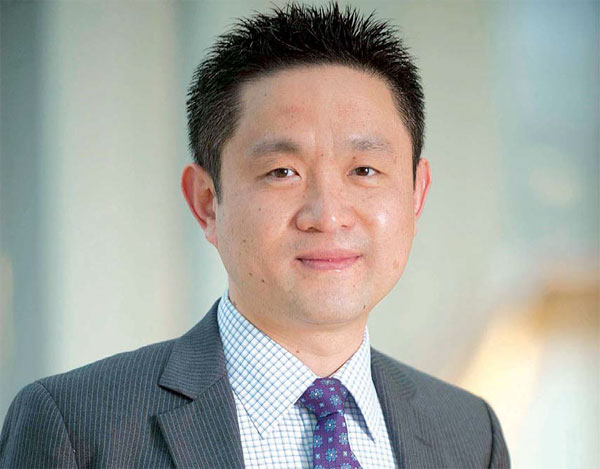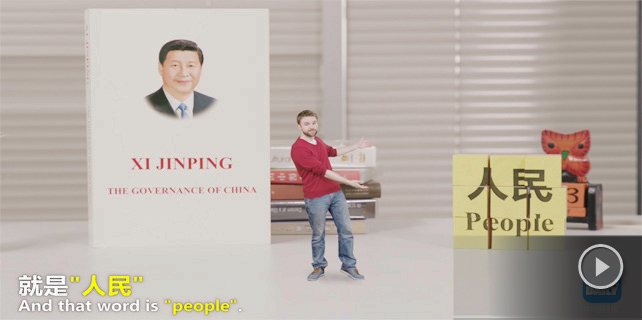Opportunities await the innovators
|
Brian Wu, founding faculty director of China initiatives at the Ross School of Business within the University of Michigan. Provided to China Daily |
China should utilize the power of its existing industries and its unique circumstances to drive progress, expert says
China should not underestimate the power of its existing industrial capability while Chinese manufacturing firms move up the value chain amid the country's structural shift, says Brian Wu, founding faculty director of China initiatives at the Ross School of Business within the University of Michigan.
Efficiently maintaining the country's industrial base, while globalizing through the intelligent use of young talent with international perspectives, is crucial for China's long-term growth, said Wu, who is also an associate professor of strategy at the university.
Wu, who has extensively researched the way in which low-cost suppliers climb the value chain to beat mature incumbents, says China can now significantly benefit from this value chain climb - if it plays its cards right.
"We have learned many lessons in the process of supplying Western companies in a hardworking and patient manner. It is important to not lose our industrial base after accumulating so much experience," he says.
Wu was born in 1976 in Pingdu, a city in Shandong province with an extensive manufacturing sector. While growing up, he saw the hard-working culture of factory employees in his home city at a time when China was rising to become the world's factory. He wondered why Chinese factory workers earned so little, despite their tremendous efforts.
His curiosity served as the foundation for Wu's academic research, first in Beijing and subsequently in the United States.
Three years ago, he led the establishment of a new training program for China Development Bank executives at the Ross School of Business.
"My thoughts on this topic were greatly enhanced through discussions with the executives," he says.
Wu's observations come as Chinese President Xi Jinping strongly champions the benefits of free trade and US President Donald Trump threatens to close his nation's doors to globalization and foreign investment.
Wu expressed support for China's stance on globalization and suggested that the next major breakthrough could come from finding a way to efficiently utilize overseas-educated Chinese people in helping Chinese companies with their global expansion efforts, especially in the case of growth through acquisitions in advanced economies.
"The question is, how do you capture the intrinsic value of what you acquire? And in advanced industries, human capital is key," he says. "Through acquisitions, Chinese firms could send their existing management abroad to the acquired firms to build experience, while recruiting overseas-educated Chinese people to take on key positions."
In 2015, more than 300,000 Chinese students attended US colleges and universities, and in excess of 90,000 learned at UK higher education institutions, making them the largest contingent of international students in both countries.
Wu says it is important for Chinese firms to attract and motivate those talented people by giving them opportunities to execute their ideas. The opportunities afforded by the management style of Chinese white goods maker Haier are a good example, he says.
At Haier, the company's management structure pivots around ZZJYTs (zi zhu jing ying ti, which means independent operation units). This unprecedented management structure was first brought to international attention in academic circles by Bill Fischer, a professor of innovation management at Switzerland's IMD business school.
Each new project or market opportunity leads to the formation of a ZZJYT, a dedicated small team of workers with a separate budget, functioning almost like an independent company. Within this structure, young Chinese graduates could set up their own projects, such as setting up a subsidiary for Haier in an overseas market.
"I've spoken to many young Chinese graduates, who are incredibly motivated, and entrepreneurial in their mindsets," Wu says. "The incentives system at Haier is perfectly suited to people like them, because for them, the experience of setting up a business operation overseas for Haier gives them entrepreneurial experience, and they will work hard to make it successful."
Turning to the policies of the Trump administration, Wu says various proposed protectionist policies are counterproductive for the US domestic market. He believes Trump has incorrectly blamed globalization for problems of domestic inequality.
"It is not globalization that has taken away jobs in the US, but rather inefficient wealth distribution. The US government could create re-education programs to help domestic workers improve their skills and find new job opportunities, rather than forcing companies to re-shore production to the US just for job creation purposes."
However, Wu points out that one potential justification for Trump's efforts to re-shore production is to build up industrial capability in the US, after witnessing the challenges of losing this capability.
"Although outsourcing production to more cost-efficient countries generates good profits, not having a big manufacturing industry could also lead to businesses losing touch with market demand. It is often through the manufacturing process that innovative ideas are generated," Wu says.
He offers the example of the Chinese electric car manufacturer BYD. Founded in 1995 as a rechargeable battery manufacturer, the company slowly used its battery technology in the making of its own electric vehicles.
"Although batteries are not high-value-adding products, BYD discovered a new direction in the making process. Without the manufacturing infrastructure, you risk becoming out of touch with consumer needs."
If China maintains its manufacturing capacity, Wu believes the country will benefit from moving its manufacturing industry inland, away from the traditional manufacturing hubs of the East China's coastal cities. He suggests they be relocated to Western cities, which would also reduce wealth inequality across the country.
Meanwhile, putting more emphasis on quality manufacturing and recognizing domestic opportunities when they arise out of market inefficiencies are also important components of the process of moving up the value chain.
"We often hear companies vowing to venture overseas due to saturation of the domestic market, but really there are still many opportunities within China, particularly arising out of China's regulatory and market inefficiencies," says Wu.
Examples of innovative firms that have made the most out of such opportunities include the Chinese e-commerce giant Alibaba and its fintech affiliate Ant Financial, as well as Wechat Pay, the payment arm of the Chinese version of Twitter, Wechat.
Both payment firms rose as solutions to challenges within China's financial markets. For instance, Ant Financial runs a Sesame Credit rating system, which assesses borrowers' credibility by drawing on Alibaba buyers' and sellers' transaction data, hence solving the challenge for Chinese borrowers of having no official credit history. This innovative credit rating system allows individuals and small and medium-sized companies to access lending that they could not otherwise obtain from banks.
Meanwhile, Wechat Pay's road to success in China was quicker and easier than those of Western counterparts Apple Pay and Samsung Pay, because Wechat Pay became available in the Chinese market at a time when China was quickly transitioning from a cash to a cashless society, and because credit card ownership is not as common as it is in mature Western economies.
"Those market inefficiencies precisely created fertile soil for innovation, and fostered the growth of a wave of Chinese tech firms," says Wu.
This trend of Chinese tech giants surpassing their Western counterparts by making good use of China's unique situation has been well documented in recent academic books, Wu says.
"There is still lots of innovation to be unlocked that will provide the solution for China to maintain both innovation and production capacity," he says.
cecily.liu@mail.chinadailyuk.com

















